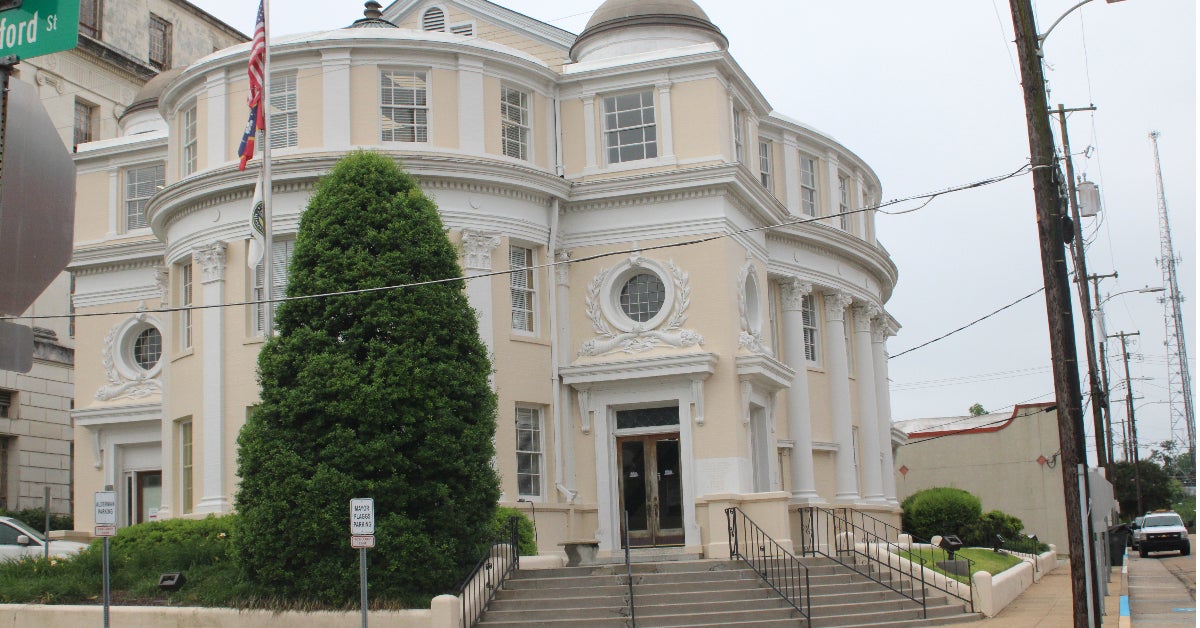Unpacking options: Alternatives to Vicksburg’s commission-style government
Published 4:00 am Saturday, October 14, 2023

- Vicksburg City Hall. (file photo/The Vicksburg Post)
Editor’s Note: This is the second in a three-part series covering why Vicksburg’s city government is established the way it is, what options there are to change it and how residents could go about doing so.
The City of Vicksburg is governed through the commission form of government, something rare among municipalities in the state.
The only other city technically operating under the commission format is Clarksdale, but even the gem of the North Delta doesn’t fully adhere to a commission-style government the way Vicksburg does.
Talks to change Vicksburg’s form of government from a three-person commission style with an at-large mayor and two geographically elected aldermen surfaced in 1996 and again in 2015.
With upcoming city elections in 2025, some people have again raised concerns about the city’s form of government.
So, what options are there?
Council-Mayor
Dr. Dallas Breen, executive director of the Stennis Institute of Government & Community Development at Mississippi State University, explains in his work, “A Primer on Forms of Municipal Government in Mississippi & How to Change Them,” the pros and cons of each of the six options for municipal government structures in Mississippi.
“It’s so critical for people to understand what form of government they operate at a local level because it’s not as simple as, ‘Well, if we just did this, then everything would be fine,'” Breen said. “But I think it’s difficult for people to understand what a change would mean or what the current situation looks like if they’re not sure how the government operates in the first place.”
While commission-style cities used to be popular in Mississippi, the majority changed in the mid-1980s to ensure governments were in compliance with the Voting Rights Act of 1965 and its one-man, one-vote rule. Cities in Mississippi today operating under the mayor-council, or “strong mayor,” format include Jackson and Meridian.
The mayor-council form is characterized by an elected mayor and city council, which is comprised of five, seven, or nine members, according to the Mississippi Secretary of State. The mayor has the power to hire and fire municipal employees and is charged with enforcing municipal laws and ordinances. The mayor must be a qualified elector of the municipality and is elected at-large. The city council exercises legislative functions in the municipality and its members are elected either by ward or by some combination of ward and at-large voting.
Council-Manager
The next form of municipal government is one Breen said is the most popular nationwide although few cities in Mississippi use it: council-manager.
The council-manager form of government does not provide a separation of executive and legislative powers between a mayor and the city council. Voters elect the members of the city council, which consists of a mayor and five councilmen. The city council exercises the legislative power of the municipality and hires a city manager, who is the chief administrative officer of the municipality. While the council is the policy-making body for the municipality, the city manager handles the day-to-day operations, including the hiring/firing of city employees, budget preparation and fiscal management. The mayor and councilmen must be qualified electors of the municipality. The mayor is elected at-large and councilmen are elected at-large or one councilman at-large and the others by ward.
“In the council-manager system, you have a city manager who is somewhat removed from politics, who is a professionally trained individual. appointed and hired by the city to run the city. City managers are on call 24/7 and answer to or are accessible by the people,” Breen said. “That tends to be the form that people tend to ask the most questions about. You have someone who more often than not is from the outside and says, ‘I’m going to make this efficient, effective, local government.’ There’s a clear vision for what needs to get done and there’s somewhat less political pressure.”
One person who has historically advocated for Vicksburg to transition to council-manager form is Harry Sharp, a former downtown business owner who led the charge in the late 1990s to advocate for a change in Vicksburg’s city government.
However, Sharp said, the movement was met with great opposition from people in power, including former mayor Robert Walker and current Mayor George Flaggs Jr., who at the time was serving in the state Legislature. Flaggs has since softened to the idea, saying recently any change in government would have to come “from the people.”
“(Walker) was vehemently opposed to it, but I told him, ‘I think this is the best for Vicksburg if we go to the council-manager format,'” Sharp said. “The mayor would be like the CEO of Vicksburg, and the manager would be the administrative officer and he would take care of the day-to-day operations.
“… It got so controversial that I became shaken.”
Council
The council form of government combines the executive and legislative powers of the municipality. Voters elect a mayor and six members of the council. The mayor is elected at-large and the remaining councilmen are elected from each ward into which the municipality is divided. If there are less than six wards, the remaining councilmen are elected at-large. Only one municipality in this state meets the population requirements for the adoption of the council form of government: Tupelo.
Code Charter
The code charter form, also known as the “weak mayor” form, has been adopted by approximately 95 percent of the municipalities in the state.
Voters elect a mayor and a board of aldermen, which varies from three, five or seven members depending on the population of the municipality. The mayor holds supervisory authority over the municipal officers and municipal affairs and is charged with enforcing the municipal laws and ordinances. The mayor must be a qualified elector of the municipality and is elected at-large. The board of aldermen holds the power to make motions and votes on municipal ordinances, orders and resolutions. Members of the board of aldermen must be qualified electors and are elected at large, by ward or a combination of ward and at large.
In this format, Vicksburg would have seven aldermen.
Private Charter
Municipalities operating under a private charter (also referred to as a special charter) were formed prior to the Mississippi Constitution of 1890 and have elected to retain their private charter. The source of the municipality’s power to act is generated from the private charter.
There are very few special charter municipalities remaining in Mississippi.
Which one is best?
The notion that one form of municipal government is better than another is not entirely plausible, Breen said.
“A lot of it boils down to understanding what the purpose or the nature of the form of government is. Where I go back to over again is you want it to be representative of the people’s will,” he said. “You can add another alderman or you can change your form of government, but you’re still going to be faced with a division or separation of powers, checks and balances, and that comes down to the question of, who do we blame?
“Accountability, to me, has always been the bottom line.”
Sharp, on the other hand, said he feels strongly that Vicksburg would benefit from the council-manager form.
“This whole city government, which has millions of dollars in its budget, should be run like a corporation. But it’s not; it’s run by a triumvirate,” Sharp said. “Where’s the progress?”





